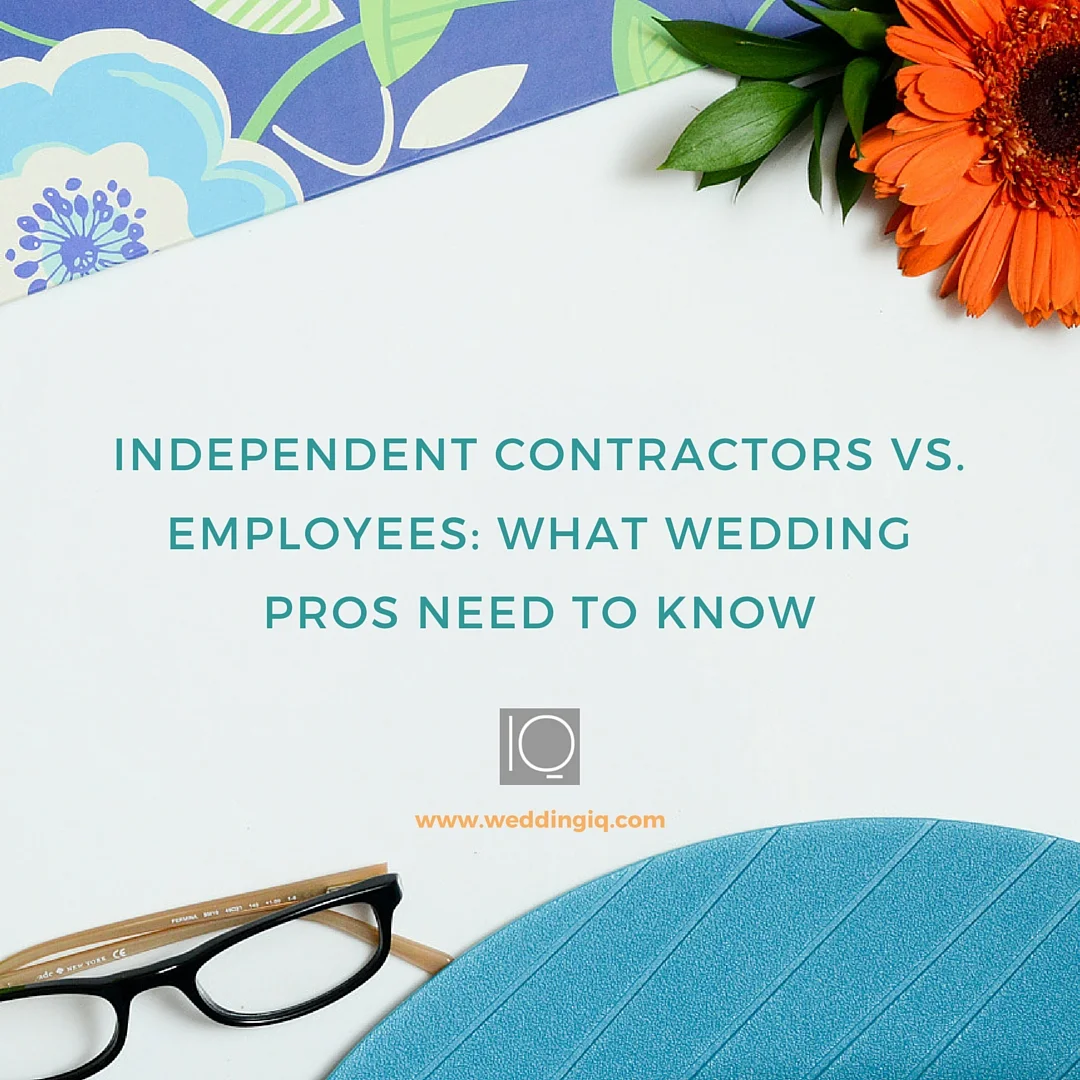Independent Contractors vs. Employees: What Wedding Pros Need to Know
(Editor's note: We're thrilled to kick off our March content theme of all the operational "stuff" you need to manage in order to maintain a successful business - contracts, bookkeeping, client and team member management, and more. Today we welcome guest contributor Annette Stepanian, an attorney who's generously provided some fantastic advice for wedding business owners and other creative professionals. Take it away, Annette!)
You’ve decided to hire some extra help for your wedding business. Perhaps you’re now sending all of your graphic design needs to a local graphic designer or maybe you’ve hired an assistant to help with the day of work for an upcoming event.
Before hiring your next worker, it’s important to understand the distinction between what makes a worker an independent contractor versus an employee and what that means for you, the business owner. Improperly classifying a worker as an independent contractor can be quite costly for your business.
Understanding Independent Contractors versus Employees
Generally, an independent contractor is a person or entity - a non-employee - who is self-employed and is in the business of offering its services to the general public. An independent contractor runs a separate business and is treated as such. One way to view whether a worker is an independent contractor is to ascertain the degree of control possessed by the worker. Generally, an independent contractor has the right to control or direct the way they do the work contracted for, including when, where and how. For example, let’s say Premier Events LLC wants to build a new website for their business. Because they don’t have the resources or skills to have this project completed in-house, they decide to contract with Sally, who is a website developer. Sally serves a variety of clients, only one of which is Premier Events LLC. Sally has her own tools, sets her own work schedule and decides how to go about working on this web development project. In this example, Sally is most likely an independent contractor.
In contrast, a worker who performs services for you is your employee if you, as the business owner, can control what will be done and how it will be done.
Why a Worker’s Classification Matters
Hiring employees (as opposed to independent contractors) imposes certain administrative responsibilities on the employer and requires an employer to pay for a variety of taxes or benefits including, but not limited to, federal taxes, social security, Medicare, unemployment, and state taxes, as well as workers compensation insurance and other employee benefits. A business doesn’t incur these obligations when it hires an independent contractor, thus usually resulting in a financial savings and fewer administrative burdens.
The correct classification of a worker as an employee or independent contractor is important because incorrectly classifying an independent contractor can be a very expensive business mistake. For example, if a federal or state agency concludes that an employee has been misclassified as an independent contractor, the employer may be subject to paying back taxes and penalties.
Determining Whether a Worker Is an Independent Contractor or Employee
Imagine a spectrum of workers where on one end you have independent contractors and on the other end you have employees. In some circumstances, it’s clear that a worker falls within one of these two categories. But more often than not, your worker falls somewhere in the middle.
There are a few factors to consider in determining the proper classification of a worker. It’s important to note that there is no one “magic” formula that applies across the board. Each agency weighs different factors to determine whether a worker has been properly classified as an independent contractor and no one factor makes the worker an employee or an independent contractor.
Here are a few factors that will support an independent contractor classification:
- Worker earns a profit or suffers a result as a result of the services they provide
- Worker has clients/customers other than the hiring business owner
- Worker provides its own tools and materials
- Worker can only be terminated according to the terms of an agreement
- Worker is paid a flat rate for the services rendered versus by a unit of time
- Worker pays its own business expenses
- Worker works on one project at a time for the business owner versus having a continuing relationship with the business owner
- Worker has discretion over how, when and where it performs its services
- Worker receives no training from the business owner
- Worker has the discretion to hire others to perform the contracted for services.
- Worker receives no employee benefits
- Worker is not required to submit regular reports to the business owner; it’s only required to deliver the end result
- Worker’s services are not part of the business owner’s day-to-day operations.
A business owner’s decision whether someone is an independent contractor is subject to review by numerous federal and state agencies, including the IRS, the Labor Department, state tax departments, and unemployment and worker’s compensation agencies. Again, there is no one set test. According to the IRS “[t]he keys are to look at the entire relationship, consider the degree or extent of the right to direct and control, and finally, to document each of the factors used in coming up with the determination.”
Why You Might Need an Independent Contractor Agreement
If a government agency questions your independent contractor classification of a worker and audits your business, a written independent contractor agreement may help prove that you and the worker have entered into an independent contractor relationship. While having a carefully drafted contract with your independent contractor doesn’t necessarily qualify a worker as an independent contractor, it’s another factor the agency will review in support of your independent contractor classification.
Also, as with any working relationship, a contract can be useful in clarifying the working relationship between you as the business owner and a worker. It might include clauses regarding the services to be performed, the compensation and such. But it can also address other important issues such as who owns the intellectual property rights to work that is created by the independent contractor and how the business owner’s confidential information will be treated by the independent contractor.
Annette Stepanian is an attorney and creative business owner who helps creative professionals and entrepreneurs lay a legal foundation for their business. To learn more, visit her website. You can also join her mailing list, find her on Instagram or Facebook, or check out her Facebook group. Be sure, also, to check out the special WeddingIQ affiliate link to Annette's contract templates for wedding planner, on the left sidebar!
Disclaimer:
This information is for educational and informational purposes only; it is not intended as and does not constitute legal advice and does not create an attorney-client relationship between you and the author. You should not act, or refrain from acting, on the basis of information provided here without first consulting legal counsel in your jurisdiction.














